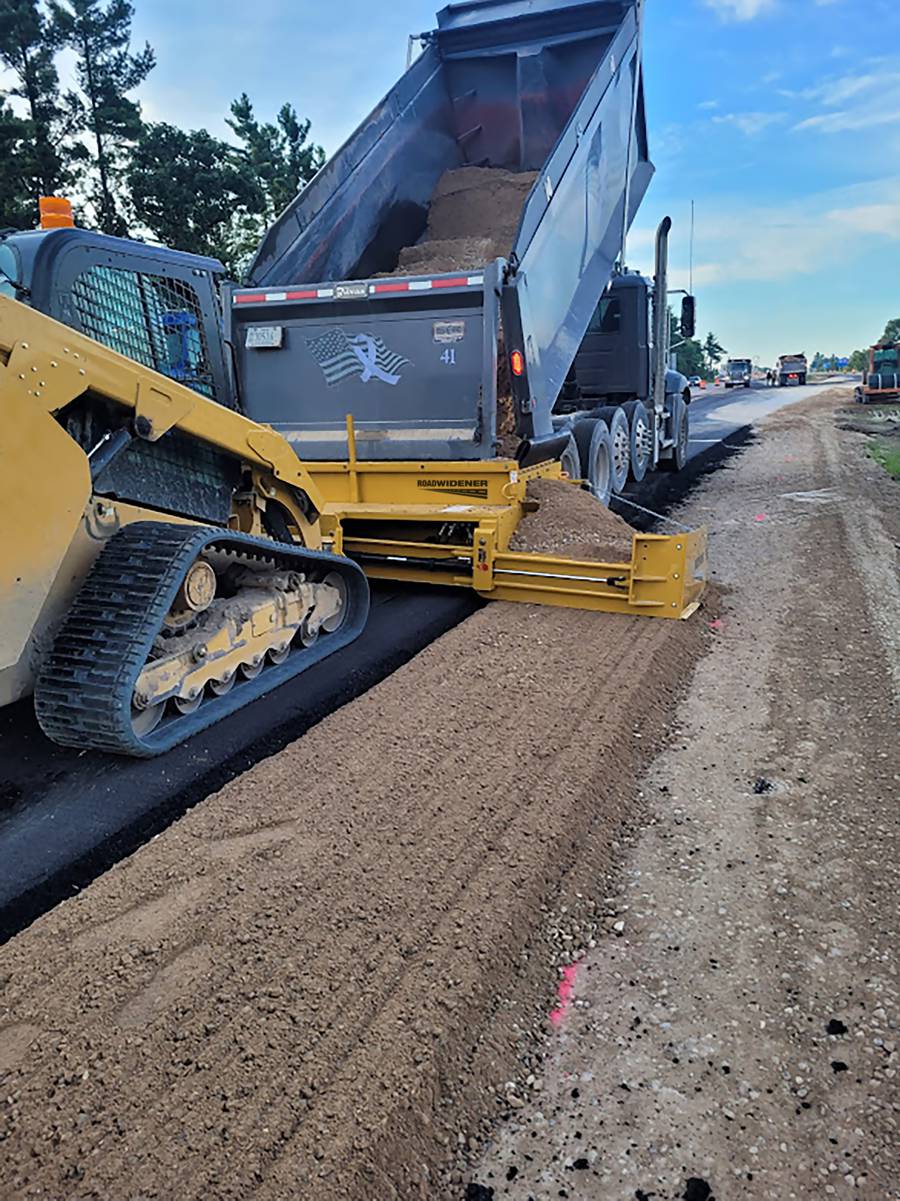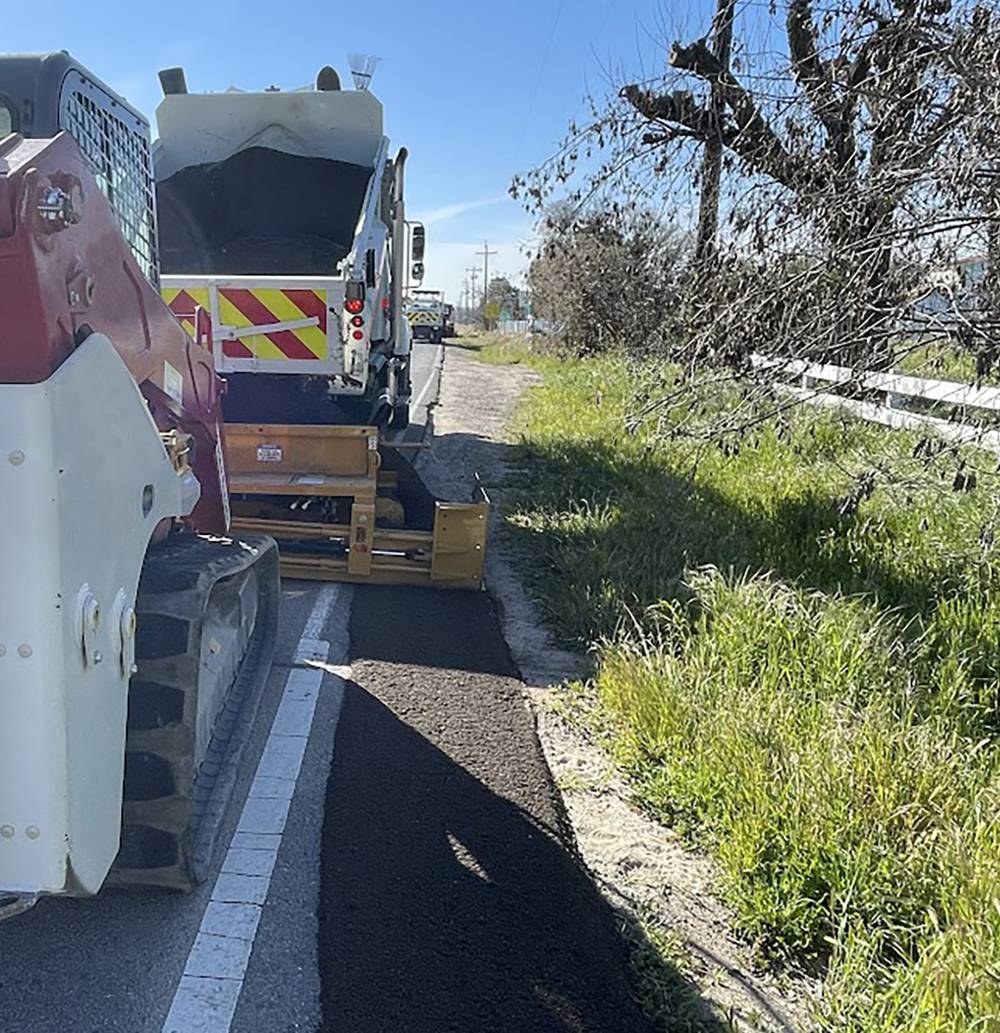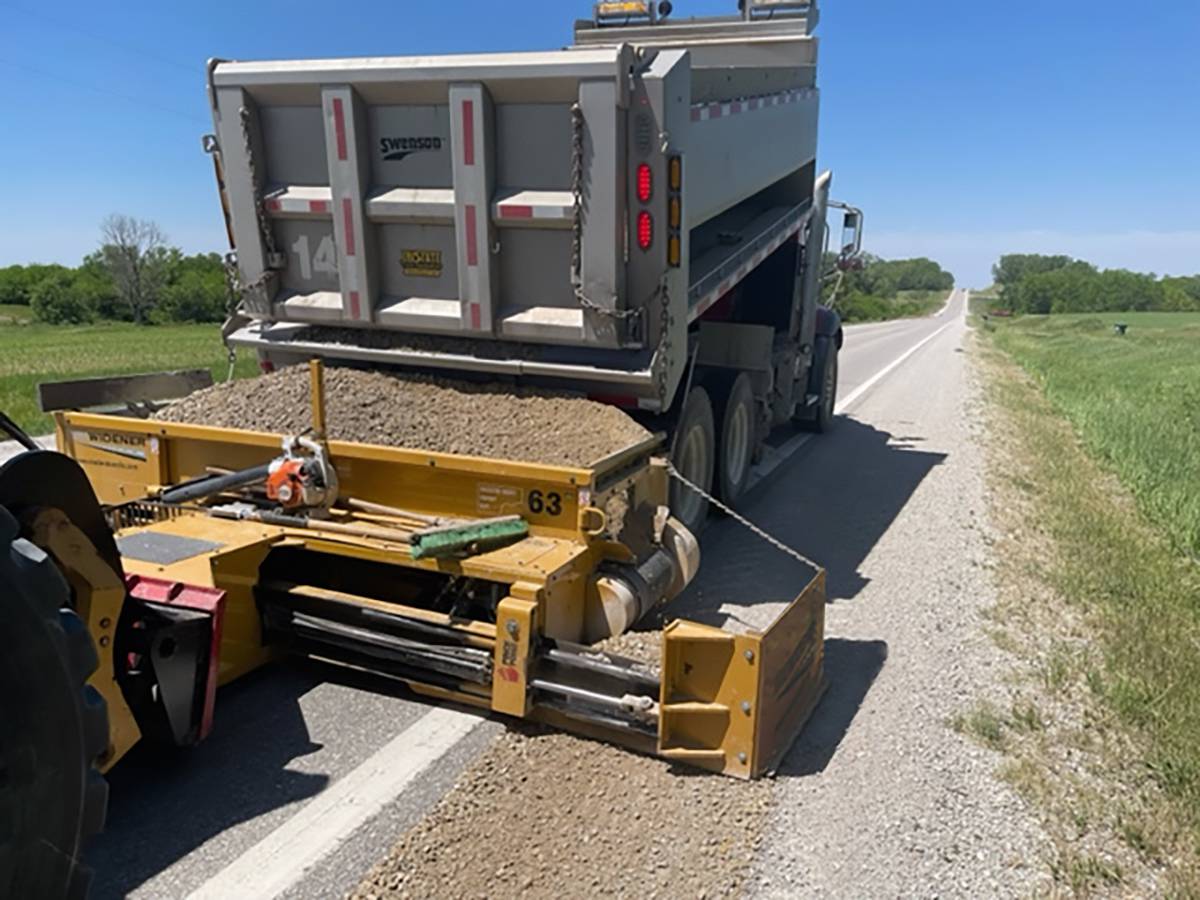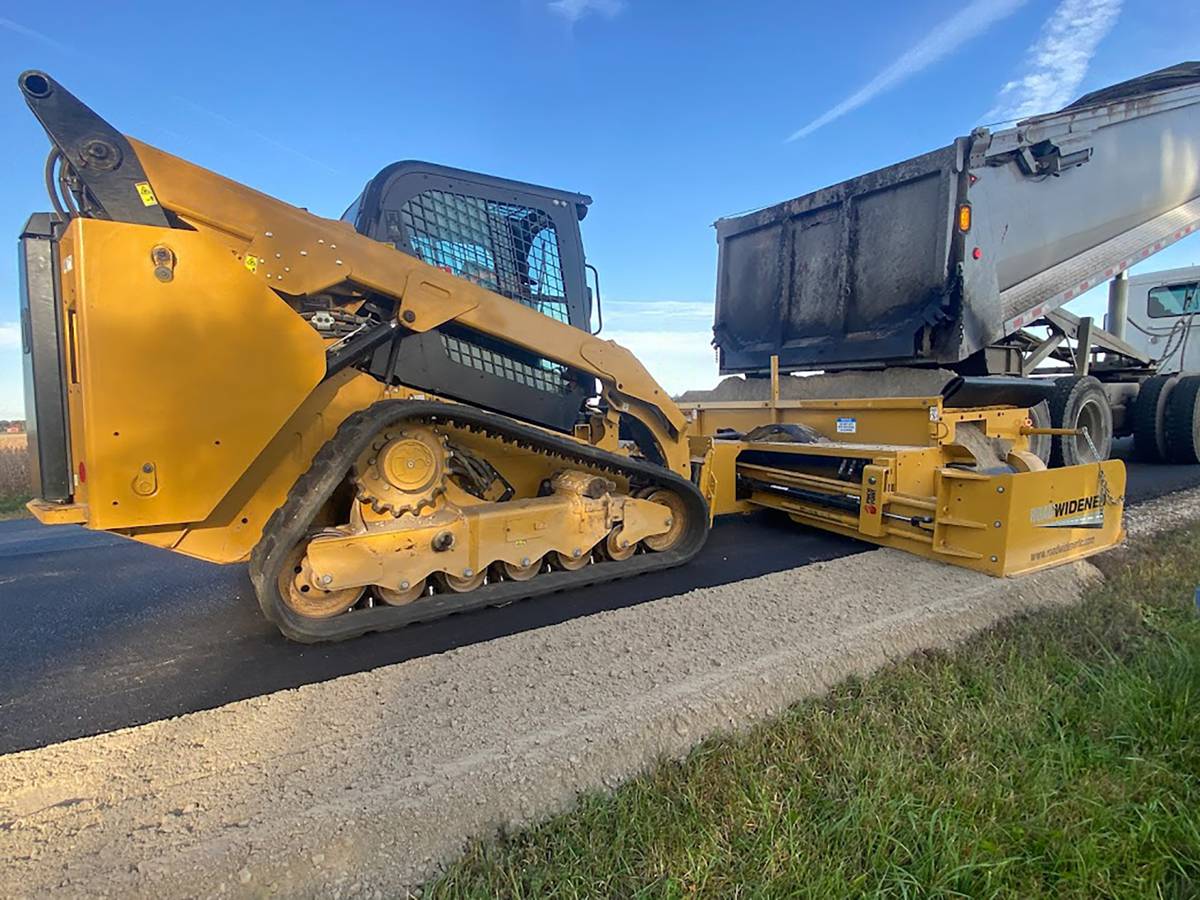Muscatine County in Iowa champions the benefits of Road Widener’s FH-R
There are a few things that come to mind when thinking about summer in the Midwest: warmer weather, weekends at the lake, camping trips — and roadwork. In fact, Midwesterners often say they have two seasons — winter and construction season.
Iowa is no exception and though the season to complete the work is much shorter, the amount of road maintenance to finish in that time is substantial. The Muscatine County Highway Department alone maintains about 600 miles of road during construction season.
Completing that much road maintenance with a limited working window before the winter months hit is no small task and requires efficient, top-performing equipment.

Bolstering Efficiency
While the actual paving and sealcoating draw much attention, the long-term integrity of the road relies on proper reshouldering. Muscatine County Highway Department road foreman Kyle Soukup and his six-man road maintenance crew traditionally completed shoulder work the old-fashioned way — with plenty of labour and elbow grease — by using less-than-precise side-discharge trucks to unload rock and a grader to push the material to the shoulder.
But the imprecise placement of material often translated into more labour to get accurate material placement and added clean up time after the placement was complete. The inefficiency of this old-school method became abundantly clear to Muscatine County Highway Department as they scrambled to complete miles of roadwork among unpredictable summer weather and an impending season end. The grader and side-discharge dump truck left rock scattered anywhere from a foot off the shoulder in the ditch to a foot into the roadway, requiring a clean-up phase with a sweeper attachment and additional man hours.
The process required a minimum of three steps starting with the discharge of the material, a pass with the grader to smooth out the material followed by a second pass to push the material back onto the shoulder. Once the material was in place, they would compact it with their ride-on roller. They repeated this three-step process for each portion of the work zone, with the blade of the grader often damaging pavement markings, resulting in costly repairs. Additionally, the process left a mess of material in its wake, leading to yet another step — clean up. This step also required additional equipment to sweep up any loose rock left on the roadway. After a few seasons using the grader method and experiencing its shortcomings in productivity and quality, Soukup decided it was time to find a more efficient way to tackle summer projects.
Kyle Soukup was conducting research when he saw a Road Widener FH-R material placement attachment at a dealership in Cedar Rapids. After seeing the design of the FH-R and learning it would do exactly what Soukup was looking for in terms of efficiency and the quality of the finished product, he contacted Road Widener, in Delafield, Wisconsin, to gather more information. The manufacturer listened to his needs and understood his scepticism for a completely new process. They suggested Soukup speak to other FH-R owners about their experience and the machine’s capabilities. He was impressed with the FH-R’s quality and by the testimonials, which led him to quickly order one for the highway department’s fleet.
Soukup spent the better part of the first month experimenting with the attachment on different carriers and fine-tuning their new FH-R to optimize performance. The flexibility of the attachment to work with several types of host machines allowed Soukup’s crew to match the host machine to the conditions of the specific project. Soukup determined a wheel loader would be optimal for their shoulder work, citing its power and ability to handle curves in the road much easier than one of their compact track loaders. With the setup locked in and all the equipment ready to go, the crew put their new attachment to work.

The Muscatine County Highway Department boosted efficiency immediately. The crew completed 8 lane miles of road using the FH-R to place Class A rock, or 3/4-inch road stone with fines. The work was completed in a single pass, cutting out the second and third steps required with the previous grader process. The new method also improved accuracy, eliminating any clean-up for loose rock on the roadway. The FH-R took what was once a two- or three-day process down to only about one day. At a minimum, it provided the Muscatine County Highway Department with a 200% increase in efficiency, making a 100% ROI achievable within four years.
The highway department tackled a similar project with the FH-R in the fall of 2022, putting down 4 miles of new 2-inch shoulder in just over two hours. The FH-R continues to improve efficiency and transform the miles of roadway they can repair in a season. In the spring of 2023, Muscatine County completed 15 miles of shouldering in just two weeks — a project that would have easily taken more than six weeks with their previous approach. Using a grader for shoulder work left the road in worse condition, causing markings on the white shoulder line. Because of this, the highway department had to perform shoulder work two weeks prior to scheduled painting to ensure the pavement stripes were restored. Using the FH-R has not only doubled efficiency but also eliminated the concern of scuffed up roads and allowed more flexibility with project timelines.
The FH-R didn’t just transform the time it took to complete individual jobs. It also significantly reduced the time it takes to get from job to job. Depending on the distance, the FH-R can remain connected to the loader and hauled as a single unit on a lowboy trailer. This saves on travel time and impact to traffic, as opposed to the previous method of slowly driving the graders to the next section of roadway which significantly increased congestion.
With a limited number of months to complete roadwork, it’s crucial to maximize the number of workdays. In the past, a rainy day shut down highway construction and repair altogether. However, because the FH-R excels at handling wet or dry material, shoulder work can still be performed during or after a rain. When conditions are too wet to pave, Soukup allocates members from his paving crew to tackle shoulder work. Two or three days of rain no longer shuts down the crew but allows a focused labour effort to complete several miles of shoulder work. When the sun comes out again, labour can be redirected to urgent projects that can’t be tackled in the rain. Constantly keeping the crew busy has led to great gains in efficiency and the ability to turn projects around faster.
“Budgets aren’t getting any bigger, so we need to be as productive as we can,” Soukup said. “People rarely think about road shoulders until it directly affects them. But when someone hits a shoulder rut and wrecks their car tire, they think about it. We’re working to prevent those issues in the most efficient manner possible.”

A Safer Method
On top of the heightened productivity, using the FH-R has improved safety for not only the Muscatine County Highway Department crew, but also for the county’s residents. Using the grader method, the operator constantly had to back up, turn and pivot, which put the large, attached blade at risk of clipping another piece of equipment or a passing vehicle. The FH-R enables a much tighter work zone, lessening employee exposure and traffic risk.
Since the FH-R accurately places material, the crew doesn’t have to worry about excess rock spilling onto the roadway or an oncoming vehicle striking it and damaging the vehicle or hurting a crew member.

Manufacturer Support
Construction equipment breaks down. It’s used hard and takes a lot of abuse so it doesn’t matter how well it is built, it eventually will show symptoms of wear. That’s why it’s important to consider manufacturer support when making any equipment investment. Losing precious time waiting for a part is not an option with a limited construction season.
On the rare occurrence when Soukup needs a part, Road Widener has typically shipped it overnight, helping to minimize downtime. All-in-all, switching to the FH-R provided benefits across the board, from having proper manufacturer support to gains in productivity and the quality of the roadwork.
“Our shoulders look a lot more finished when we’re done,” Soukup said. “They don’t have those rough edges they used to have after we used the motor grader; the FH-R does a much nicer, cleaner job. We used to have to redo shoulder work at least every other year because the results weren’t up to this quality. The Road Widener has extended the lifetime of our road shoulders so, at times we traditionally started planning for replacement, we aren’t even considering it. The highway department isn’t a professional shouldering company, but for what we do, our end product looks really nice when we’re done.”




























